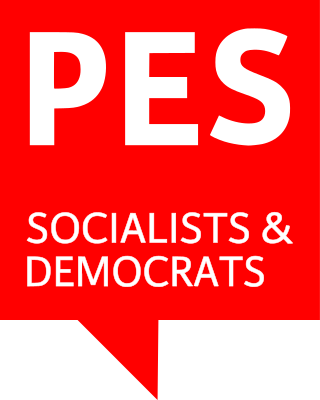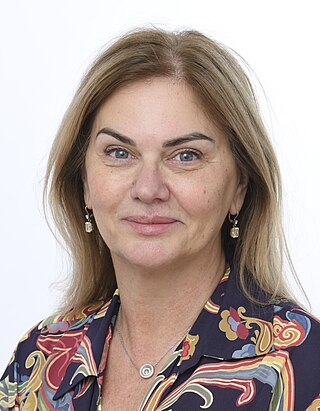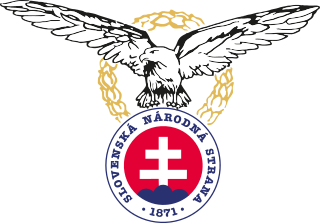Related Research Articles

The Party of European Socialists (PES) is a social democratic European political party.
Politics of Slovakia takes place in a framework of a parliamentary representative democratic republic, with a multi-party system. Legislative power is vested in the parliament and it can be exercised in some cases also by the government or directly by citizens.
The electoral threshold, or election threshold, is the minimum share of votes that a candidate or political party requires before they become entitled to representation or additional seats in a legislature. This limit can operate in various ways, e.g. in party-list proportional representation systems where an electoral threshold requires that a party must receive a specified minimum percentage of votes, either nationally or in a particular electoral district, to obtain seats in the legislature. In single transferable voting, the election threshold is called the quota, and it is possible to achieve it by receiving only first-choice votes alone or by a combination of first-choice votes and votes transferred from other candidates based on lower preferences. In mixed-member-proportional (MMP) systems, the election threshold determines which parties are eligible for top-up seats in the legislative chamber. Some MMP systems still allow a party to retain the seats they won in electoral districts even when they did not receive the threshold nationally; in these systems, top-up seats are allocated to parties that do not achieve the electoral threshold if they win at least one district seat or meet some other minimum qualification.

The Slovak Democratic and Christian Union – Democratic Party is a liberal-conservative, Christian-democratic political party in Slovakia. The SDKÚ-DS was a member of the Centrist Democrat International and was a member of the European People's Party until 2018, when it was expelled due to inactivity.

Direction – Social Democracy, also commonly referred to as Smer, is a left-wing nationalist and left-wing populist political party in Slovakia led by the incumbent prime minister Robert Fico. The party identifies as social-democratic, and was described as a combination of "leftist economics and nationalist appeal".

The Christian Democratic Movement is a Christian-democratic political party in Slovakia that is a member of the European People's Party (EPP) and an observer of the Centrist Democrat International.

An election of Members of the European Parliament representing Slovakia for the 2004–2009 term of the European Parliament was held on 13 June 2004 as part of the wider 2004 European election. The turnout was the lowest of any country in the European Union. Support was evenly distributed among five parties.

Monika Beňová is a Slovak politician who has been a member of the European Parliament since 2004. She is a member of the centre-left Direction-Social Democracy party SMER-SD. SMER-SD is a member of the Party of European Socialists. She presently serves on the Committee on the Environment, Public Health and Food Safety. At the same time she serves as a Quaestor of the European Parliament and therefore she is a member of the European Parliament's Bureau. In present she has opposite views as her mother party - Smer, for example on European Union, NATO, LGBTQ rights in Slovakia, conflict in Ukraine and so on.

The Slovak National Party is an ultranationalist political party in Slovakia. The party characterizes itself as a nationalist party based on both social and European Christian values.
There are five types of elections in Slovakia: municipal elections, regional elections, parliamentary elections, presidential elections and elections to the European Parliament. All four types of elections are normally held after fixed periods, although early elections can occur in certain situations. Elections are conventionally scheduled for a Saturday - the polls normally open at 7:00 in the morning and close at 22:00 in the evening. Citizens aged 18 years or older are eligible to vote. Those serving prison sentences for particularly serious crimes, as well as those deprived of legal capacity, including persons with mental disabilities, are denied the right to vote. Voter registration is passive and decentralized with the voter register maintained by municipalities based on the permanent residence register. Voter lists are updated continuously based on municipal records and input provided by state institutions or other municipalities. Voters may verify their data in voter lists, and, if necessary, request correction until the day before election day. On election day, a voter can be added to a voter list upon presenting an identity card with proof of residency. Some 4.4 million voters are registered and valid to vote in the elections. Voters are only able to vote from abroad during the Parliamentary Elections in Slovakia.

Freedom and Solidarity, also called Saska, is a centre-right liberal and libertarian political party in Slovakia. Established in 2009, SaS was founded by economist Richard Sulík, who designed Slovakia's flat tax system. It generally holds anti-state and neoliberal positions. After the 2020 Slovak parliamentary election, the party lost several seats in the National Council but became part of the coalition government with Ordinary People and Independent Personalities, For the People, and We Are Family. It is led by businessman Branislav Gröhling.

Most–Híd 2023 is an inter-ethnic political party in Slovakia. Its programme calls for greater cooperation between the country's Hungarian minority and ethnic Slovak majority. It was one of four parties in the Fico III government coalition, but lost all its seats in the National Council in the 2020 Slovak parliamentary election.

Maroš Šefčovič is a Slovak diplomat and politician serving as Executive Vice-President of the European Commission for the European Green Deal since 2023, as well as Vice-President of the European Commission for Interinstitutional Relations since 2019, previously holding the office from 2010 to 2014. He has been member of the European Commission since 2009. Šefčovič also stood for office in the 2019 Slovak presidential election, which he lost against Zuzana Čaputová.
Slovakia, known as Ordinary People and Independent Personalities until 2023, is a conservative political party in Slovakia. Founded in 2011 by former businessman Igor Matovič, the party has been characterized primarily as populist, championing anti-corruption, anti-elitist and anti-establishment sentiments.

Elections to the European Parliament took place in Slovakia on 24 May 2014. It was the third European election which took place in Slovakia.

We Are Family is a national-conservative and right-wing populist political party in Slovakia founded in 2011. It is led by businessman Boris Kollár who was Speaker of the National Council from 2020 to 2023.

Progressive Slovakia is a liberal and social-liberal political party in Slovakia established in 2017. The party is led by Michal Šimečka, a former Vice President of the European Parliament. It is a member of the Renew Europe group and is a full member of the Alliance of Liberals and Democrats for Europe Party. PS has three MEPs: Michal Šimečka, Martin Hojsík, and Michal Wiezik ; the latter left the EPP and Democrats to join PS.

Renew Europe (Renew) is a liberal, pro-European political group of the European Parliament founded for the ninth European Parliament term. The group is the successor to the Alliance of Liberals and Democrats for Europe (ALDE) group which existed during the sixth, seventh and eighth terms from 2004 to 2019, and under a variety of other names in earlier Parliaments. Renew Europe in the European Committee of the Regions is the sister group of Renew Europe.

Change from Below, Democratic Union of Slovakia, in the years 2000—2002 Liberal Democratic Union, and 2002—2010 Democratic Union of Slovakia, is a non-parliamentary political party in Slovakia since 2000. Its chairman Ján Budaj is a member of the National Council of the Slovak Republic elected on the OĽaNO party's list of candidates.
The Hungarian Alliance is a political party in Slovakia for the ethnic Hungarian minority, previously known simply as the "Alliance", it was founded when "Party of the Hungarian Community" and Most–Híd merged into "Hungarian Community Togetherness". It is led by former SMK-MKP leader, Krisztián Forró.
References
- European Parliament (2014). "European Parliament / Results of the 2014 European elections". European Parliament. Retrieved 2016-07-25.